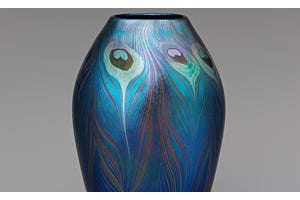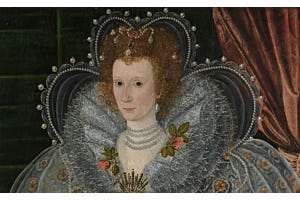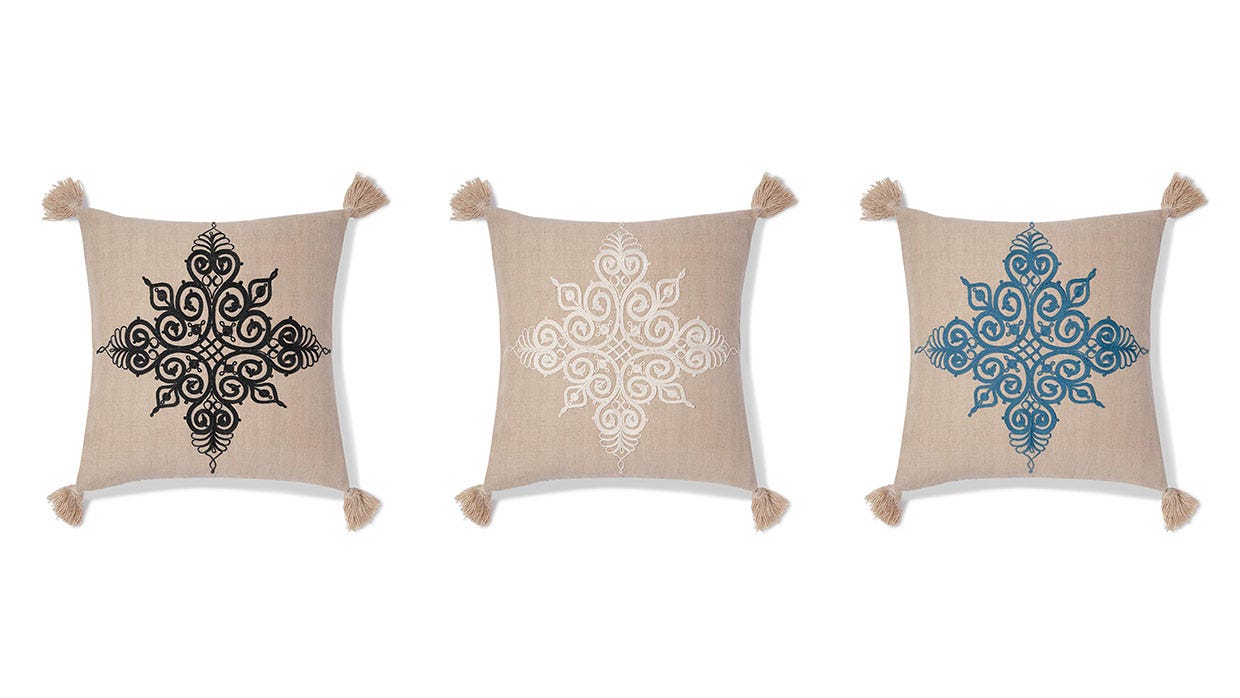
Wielding an ethos of female empowerment through craft, Malaika founders Margarita Andrade and Goya Gallagher see the potential for more than just luxury linens in Egyptian cotton. In 2018, the Ecuador-born, Egypt-based design duo established a self-funded school that teaches underprivileged Egyptian women and refugees how to sew. Once a proficient skill level is achieved, each craftswoman returns home to make space for new students and enjoy financial independence—without upending social or familial traditions—by realizing Malaika’s sumptuous fabric designs.
We had the opportunity to chat with CEO and cofounder of Malaika, Goya Gallagher, to learn more about Malaika’s contribution to the Heirloom Project, as well as to discuss her relationship with Egypt, preserving craftsmanship, and why ethical business practices are so important.
Tell us about yourself and your brand!
Many years ago, my business partner, Margarita Andrade, and I feel so in love with Cairo that we never left. Cairo is a city like no other—a timeless place, rife with history, teeming with people, noisy, sleepless, and yet, spiritual and life-affirming. The idea of Malaika, meaning “angels” in Arabic, was born here, in 2003. With a background in design and an interest in embroidery, Margarita and I decided to use Egyptian cotton, renowned for its long staple and fine yarns, to produce high-quality linens. In the following years, the range of products expanded widely with the view to preserve and promote traditional Egyptian crafts, including Khayameya, a decorative appliqué textile; the corded embroidery found in Cairo’s Khan Khalili bazaar; blown glass from the workshops of the “City of the Dead”; and the pottery of Fayoum and Al Fostat. We work closely with artisans to create unique pieces and offer them a platform to showcase their work.
Malaika has always aimed to have social impact by offering women in Cairo the opportunity to learn to embroider at our premises, so that they could earn a living while working from home. The model grew from the idea that women, regardless of age, background, or literacy, can learn to sew. In 2018, with the view of expanding our reach, we established Threads of Hope, an embroidery school and center open to other brands looking to include embroidery in their designs. To date, hundreds of underprivileged Egyptian women and refugees have passed through the center to learn embroidery techniques. At Malaika Linens, we celebrate these women’s talents and sheer determination.
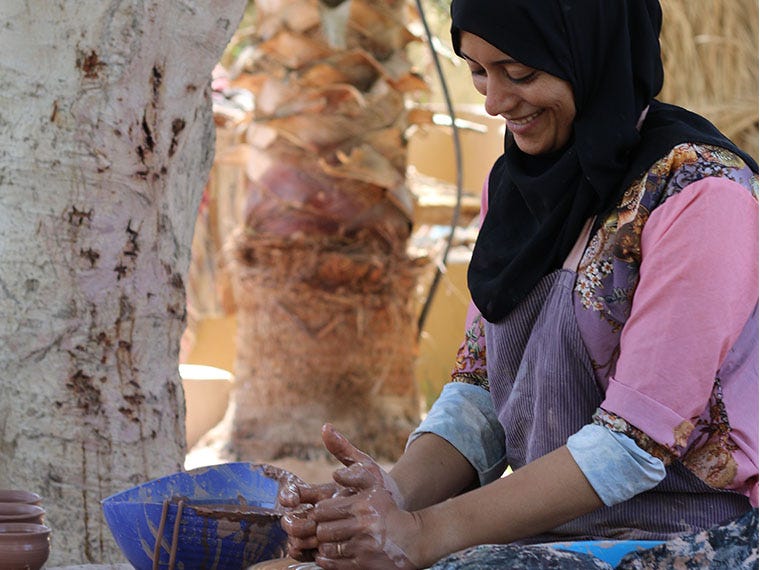

What’s your philosophy as an artisan/designer?
As a brand, we believe in collaboration and embracing Egypt’s rich history of craftsmanship. We relish the opportunity to work with other designers, other brands, and mostly importantly, with artisans. It makes the design process a far more creative experience when we work together on new products as well as tackling production challenges. Engaging with artisans, and getting to know the people who make our objects, is one of the most rewarding aspects at Malaika.
How does that philosophy factor into the items you produce?
Our philosophy is that there must be synergy between the maker of a product, the product itself, and the end user. Who makes the product and how, matters as much as the beauty and quality of the product and as much as the home the product will eventually find. We like to think that traditional craftsmanship infuses objects with storytelling, goodwill, and some magic.
Can you talk a bit about your contribution to the Heirloom Project?
We have produced pottery and hand-embroidered cushion for the Heirloom Project. We have a pomegranate pottery collection made by artisans in Al Fostat, an area that was once the first Islamic capital of Egypt, founded in 641, and would become prosperous as a result of its glassware and pottery. This tradition has been kept alive for over 1,000 years. The pomegranate has been an important symbol in Egypt since Pharaonic times. An ancient Egyptian proverb says, “Eat a pomegranate and visit a bath; your youth will hasten back.” According to Islamic legend, each fruit has one seed descended from paradise. The image of the pomegranate is prominent throughout the craft history of Egypt, from pottery and textiles to wood and metalwork. For the Heirloom Project, we have made plates, candle holders, a jam jar, and salt-and-pepper shakers, all handmade in the shape of a pomegranate.
Finally, we have decorative cushions that are hand-embroidered using a traditional cording technique. The Met has some beautiful examples in its collection of textiles using this type of craftmanship dating back to the 14th century. Made popular during Mamluk times, corded work continues to be made by skilled artisans in the heart of medieval Cairo. Traditionally this type of embroidery was used to adorn military unicorns and clothing, and we have reinterpreted it on a decorative cushion for the Heirloom Project.
What excites you most about the Heirloom Project?
That an institution of the caliber and reach of The Met has chosen to work with and celebrate artisans and crafts is exciting and reassuring. Exciting because it means the possibility of wide recognition for artisans of the Middle East, which are often overshadowed by regional challenges and conflict. Reassuring because it means that at an institutional level, craftsmanship and the work of artisans is valued. The idea to see crafts from different countries in the regional all under one roof is exciting, and I’m sure will spur creative conversations. Reaching The Met is a testament to the hard work and excellence of these artisans.
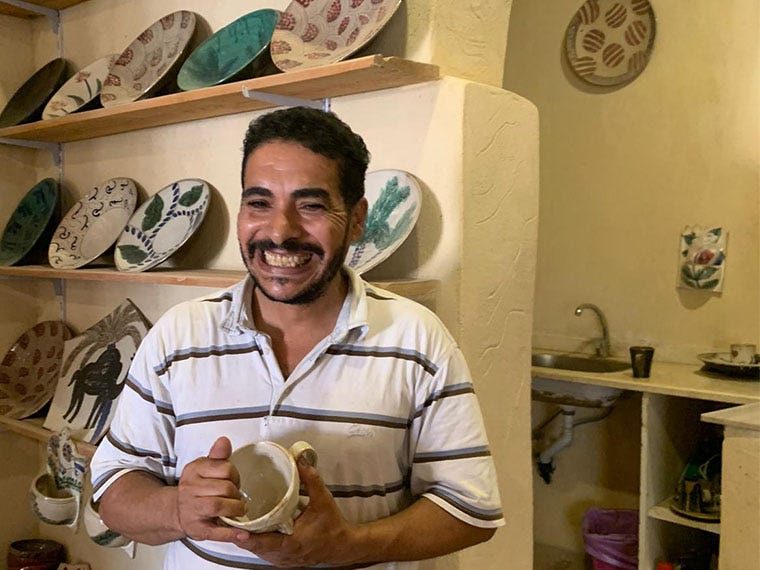

Is there anything in particular that you hope the public will learn from or appreciate about this initiative?
I hope they learn about the people making these products. How they have managed to carry on crafts from one generation to the next, for thousands of years. Each piece they make is unique and each tells a story of the maker and brings the rich history of this region to life.
Where else do you typically derive creative inspiration from?
Egypt is an infinite source of inspiration. From the rich ancient Egyptian pictorial history to Coptic textiles, Fatimid ceramics, Mamluk embroidery, Alexandria’s cosmopolitan past, Cairo’s bustling energy, the timeless beauty of the Nile, the Upper Egyptian villages passing crafts for generations…the list is endless.
What’s next for you?
We are expanding our offering and engaging with more Egyptian artisans. We hope to reach more international customers and act as a bridge between artisans in Egypt and the rest of the world. Next on our agenda is to create a community center for artisans in Egypt, where we can hold workshops, have a library and computers, and offer a space to engage and share ideas as well as assist with setting up financial and legal structures.
The Malaika Linens Embroidered Scrolling Vines Motif Pillows are available online and at The Met Fifth Avenue.



